Some of the links in this article are affiliate links, meaning that if you click the link, I may get a small portion of the sale at no cost to you. In no way does this affect our description or review of the following products. As an Amazon Associate, I earn from qualifying purchases.This is of no cost to you and does not skew our recommendations.
In the last few years, the fashion industry has seen a significant rise in the demand for sustainable and eco-friendly products, and today, the call for sustainability echoes louder than ever. Eco-friendly t-shirt printing is the new standard for those seeking stylish yet ethically conscious wardrobe options.
Traditionally, fast fashion exacted an ecological toll, relying on harmful chemicals and petroleum-based inks, leaving behind an unsustainable environmental footprint. However, within this shift towards sustainability, a narrative challenges these outdated practices, now embraced by many mainstream fashion brands.
This article navigates beyond aesthetics, exploring sustainable materials—like the sumptuous softness of organic cotton, the durable charm of hemp, and the versatile allure of bamboo. Each fabric embodies a commitment to comfort while preserving the planet’s welfare.
By adopting eco-conscious fabrics and greener printing techniques, companies redefine garment creation, catering not only to environmental responsibility but also to the ethical needs of conscious consumers and vegans.
Discover how your t-shirt becomes a statement of conscious consumerism, empowered by the secrets of identifying genuine eco-friendly and vegan products.
Related: 12 Canadian Approved Vegan Winter Snow Boots: Warm and Waterproof!
The first step to eco-friendly t-shirt printing: Selecting the Right T-Shirt Materials
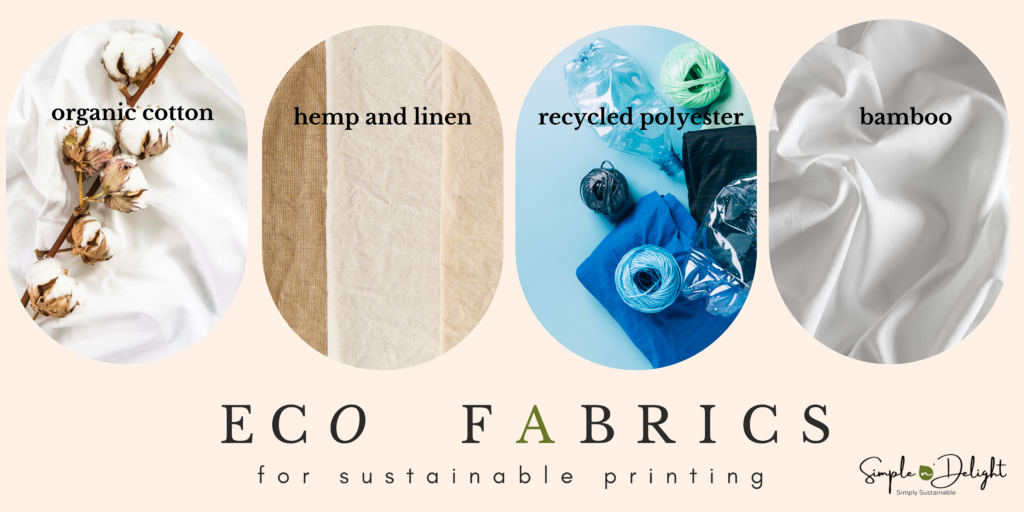
When it comes to eco-friendly and vegan t-shirt printing, selecting the right materials is a crucial step. Many vegan-friendly alternatives to conventional materials are available on the market. One popular choice is organic cotton, which is grown without the use of harmful chemicals and pesticides. Other sustainable options include hemp, bamboo, and recycled polyester.
Organic cotton, known for its softness and breathability, offers a comfortable and sustainable choice for vegans. It is biodegradable and reduces the environmental impact caused by traditional cotton production.
Hemp is another excellent choice as it requires minimal water, pesticides, and herbicides. It is a durable material with natural antimicrobial properties.
Bamboo fabric is gaining popularity due to its regenerative properties and versatility. It grows quickly and does not require as much water or pesticides as traditional crops.
Lastly, recycled polyester, made from plastic bottles and other recycled materials, reduces waste and saves energy during the manufacturing process.
Eco-friendly materials often have lower environmental footprints compared to their traditional counterparts. They address concerns such as deforestation, pollution, and waste. Moreover, vegan t-shirt printing options promote cruelty-free practices by avoiding animal-derived materials such as silk or wool.
Related: Why Organic Cotton Underwear Is Your Ultimate Choice for Health and Comfort
The second step to eco-friendly t-shirt printing: Selecting the Right Printing Techniques
In addition to choosing sustainable materials, the printing techniques used also contribute to the overall eco-friendliness of graphic t-shirt production. Several methods minimize the environmental impact and offer vegan-friendly alternatives.
Eco-friendly inks can vary depending on the specific type and manufacturer, but here are some common components when eco-friendly t-shirt printing:
- Vegetable-Based Ingredients: Eco-friendly inks often use vegetable-based oils derived from sources like soybeans, linseed, or corn.
- Natural Pigments: Manufacturers utilize natural pigments and dyes derived from plant-based sources or minerals to achieve coloration in eco-friendly inks. These pigments avoid the use of heavy metals or toxic substances found in some traditional ink formulations.
- Water-Based Formulations: Some eco-friendly inks are water-based, meaning they use water as a solvent instead of harsh chemicals. Water-based inks reduce the emission of volatile organic compounds (VOCs) and minimize environmental impact during the printing process.
- Low VOC Content: Volatile organic compounds (VOCs) are potentially harmful chemicals that can evaporate into the air.
- Biodegradable Components: Manufacturers strive to incorporate biodegradable or compostable components into eco-friendly ink formulations, ensuring that the ink breaks down more easily after disposal, reducing its environmental impact.
Take a look at how this company is dedicated to eco-friendly T-shirt printing:
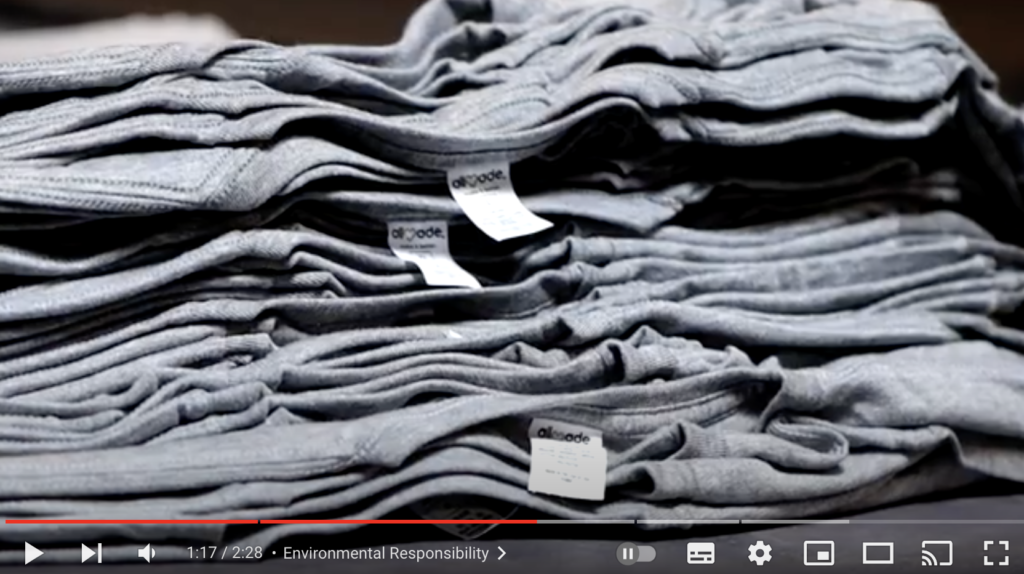
Eco-friendly inks are designed to be more sustainable and less harmful to the environment throughout their lifecycle, from production to application and disposal. They offer a greener alternative for various printing applications while minimizing the negative ecological effects associated with traditional ink formulations.
Screen printing using water-based inks is a popular choice among eco-conscious designers. This method uses less water compared to other printing techniques and allows for vibrant and long-lasting prints. Digital printing, another environmentally friendly option, uses less ink and water, resulting in reduced waste.
Related: How to Find the Safest Vegan Tattoos
Eco-Friendly T-Shirt Printing: Differences From Conventional Printing Methods
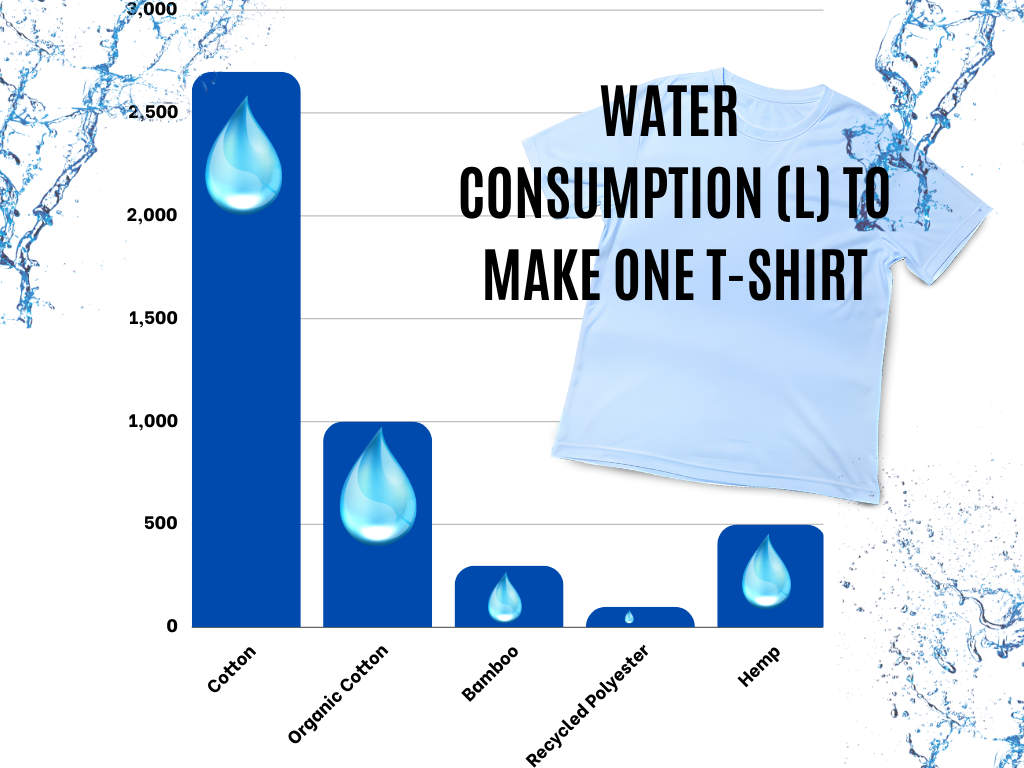
Conventional printing methods often involve the use of harmful chemicals, such as petroleum-based inks and harsh cleaning solvents. These chemicals can have detrimental effects on the environment and human health. In contrast, eco-friendly printing methods prioritize the use of natural and non-toxic alternatives, reducing pollution and minimizing the carbon footprint.
Eco-friendly t-shirt printing also promotes sustainable waste management. The industry aims to reduce waste by recycling water, properly disposing of hazardous materials, and optimizing the use of resources. By implementing these practices, eco-friendly printing methods contribute to a healthier and greener planet.
Related: 15 Best Sustainable Women’s Shoes for a Greener Footprint
Eco-Friendly T-Shirt Printing: Identifying Genuine Eco-friendly and Vegan Products
With the increasing demand for eco-friendly and vegan t-shirts, it is important to be able to identify genuine products. Look for certifications such as the Global Organic Textile Standard (GOTS) or the Vegan Society logo. These certifications ensure that the product adheres to strict standards regarding materials, production processes, and ethical practices.
Additionally, conducting thorough research on the brand and supplier can provide insight into their transparency and commitment to sustainability. Look for companies that prioritize sustainability, engage in fair trade practices, and take steps towards reducing their environmental impact.
Related: Reasons Why We LOVE These 15 Vegan Slippers and Why You Should Too!
Eco-Friendly T-Shirt Printing: Supplier Transparency
Supplier transparency plays a crucial role in the eco-friendly t-shirt printing industry. It allows consumers to make informed purchasing decisions based on the ethical practices of the suppliers. Transparency ensures that the materials used are truly eco-friendly and vegan, and that the entire supply chain follows sustainable practices.
Choosing suppliers who are transparent about their sourcing, manufacturing, and printing processes helps to support companies with genuine commitments to sustainability and vegan-friendly practices.
Eco-Friendly T-Shirt Printing: Brands Exemplifying Transparent Practices
Several brands are leading the way in eco-friendly t-shirt printing and exemplifying transparent practices. There are numerous companies that prioritize using organic and recycled materials, implement low-impact printing methods, and work with fair trade manufacturers. By supporting these brands, consumers can contribute to the growth of a sustainable fashion industry and promote cruelty-free practices.
Patagonia
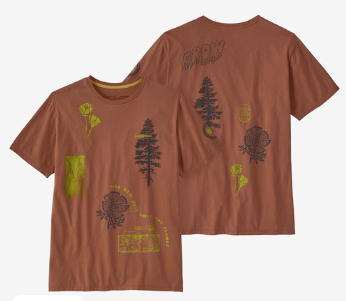
Known for its environmental activism, Patagonia offers a range of eco-friendly t-shirts made from organic cotton and recycled materials. They prioritize fair labor practices and transparent supply chains.
Tentree

This brand is dedicated to sustainability and planting trees for every item sold. They offer t-shirts made from eco-friendly materials like TENCEL™, organic cotton, and recycled polyester.
Pact

Pact focuses on organic cotton and fair trade practices, offering comfortable and ethically produced t-shirts. They emphasize transparency in their supply chain and use eco-friendly dyes.
Happy Earth
This brand emphasizes eco-friendly fabrics like organic cotton, recycled materials, and low-impact dyes. They are committed to fair labor practices and transparency in their manufacturing.
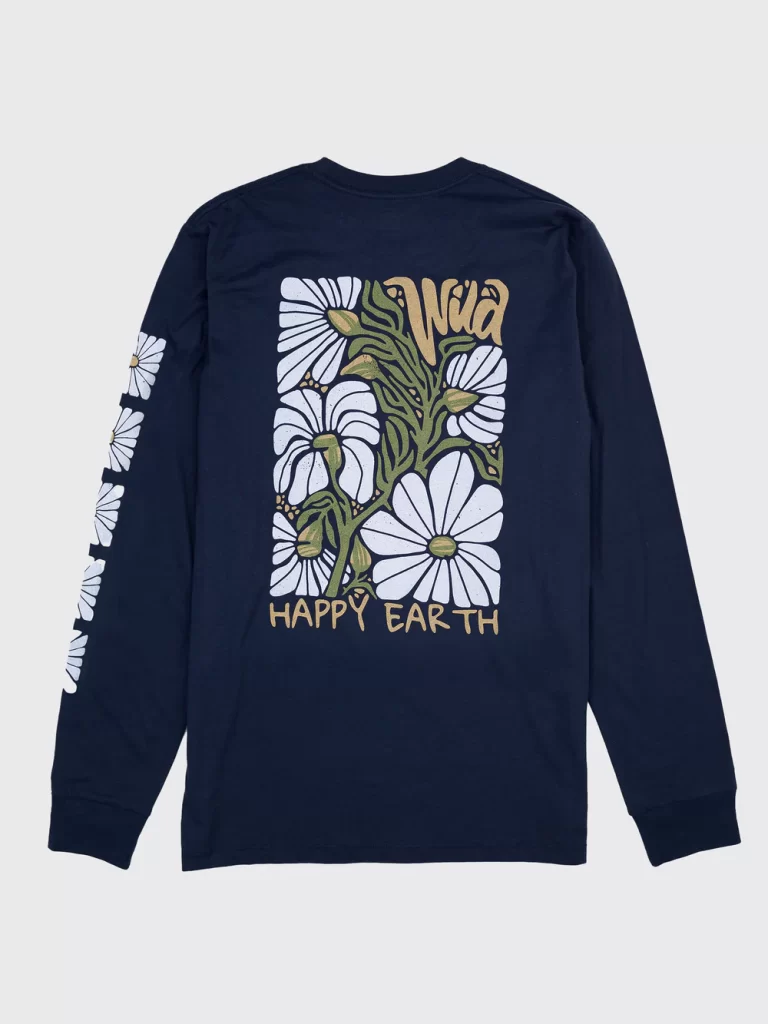
Prana

Known for yoga and activewear, Prana offers t-shirts made from organic cotton and recycled materials. They prioritize sustainability and ethical manufacturing processes.
Eileen Fisher
While known for broader apparel, Eileen Fisher has a sustainable line offering t-shirts made from organic cotton and recycled fibers. They focus on transparency and ethical sourcing.
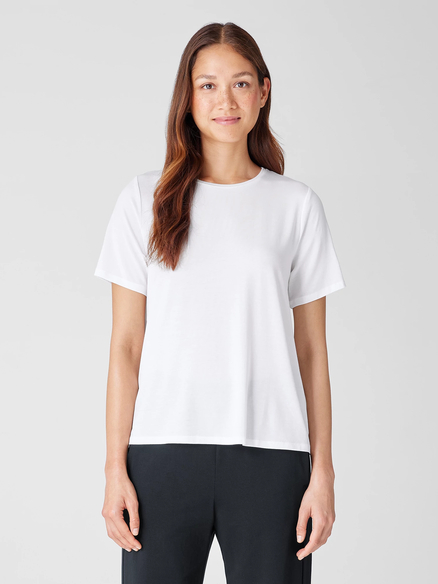
United By Blue
This brand combines fashion with ocean conservation. They produce eco-friendly t-shirts made from organic cotton and recycled polyester, and for every product sold, they remove one pound of trash from oceans and waterways.

Outerknown

ounded by professional surfer Kelly Slater, Outerknown emphasizes organic and recycled materials in their t-shirt production. They prioritize fair labor and sustainability.
Eco-Friendly T-Shirt Printing: Cost and Accessibility
While eco-friendly t-shirts may have a slightly higher upfront cost compared to conventional options, the long-term benefits outweigh the initial investment. By choosing sustainable materials and responsible printing methods, the overall environmental impact is reduced, making these graphic t-shirts a more cost-effective choice in the long run.
Moreover, as the demand for eco-friendly products continues to rise, accessibility has become increasingly easier.
Eco-Friendly T-Shirt Printing: Durability and Quality of Eco-friendly T-shirts
One common misconception about eco-friendly t-shirts is that they lack durability or compromise on quality. However, this couldn’t be further from the truth. Sustainable materials such as organic cotton and hemp are known for their strength and longevity.
Eco-friendly t-shirts undergo rigorous testing to ensure their durability. They are designed to withstand regular wear and tear, making them a reliable and long-lasting choice. By investing in eco-friendly options, consumers can enjoy high-quality garments that support ethical and sustainable practices.
Eco-friendly printing inks also exhibit impressive durability, upholding color vibrancy and quality through numerous wash cycles. Rigorously tested, these inks retain their integrity without fading or compromising designs, ensuring a lasting imprint on garments while minimizing environmental impact.
The fusion of durable eco-friendly inks with resilient fabrics like organic cotton or hemp adds to the longevity of eco-friendly t-shirts, offering consumers enduring designs that will last many washes to come.
Innovation and Future Trends Shaping Sustainable T-shirt Production
The world of eco-friendly t-shirt printing is continuously evolving, with technology and innovation playing a significant role. As sustainability becomes a priority for consumers and the industry, researchers and designers are exploring new methods and materials.
Advancements in textile recycling, such as turning old t-shirts into new fabrics, are gaining momentum. Circular fashion concepts aim to reduce waste by closing the loop and creating a more sustainable production cycle.
Want to see a company turn old clothes into new, check out this video down below:

Technologies like 3D printing and digital fabric printing, which require less water, energy, and materials, are also expected to shape the future of sustainable t-shirt production. These innovations offer exciting opportunities for the industry to further reduce its environmental impact and provide consumers with more eco-friendly options.
Eco-Friendly T-Shirt Printing FAQ
Why is eco printing important?
Eco printing is important because it minimizes the environmental impact by using natural dyes, organic materials, and sustainable practices, reducing water consumption and chemical waste in the textile industry.
What makes a Tshirt eco-friendly?
A T-shirt can be considered eco-friendly if it’s made from organic or recycled materials, dyed with natural or non-toxic dyes, produced using sustainable and ethical practices, and has a minimal carbon footprint throughout its lifecycle.
What is the more environmentally friendly option for t-shirt printing?
Screen printing with water-based or discharge inks tends to be more environmentally friendly for T-shirt printing compared to traditional plastisol ink methods due to lower chemical usage and water waste.
Is sublimation printing bad for the environment?
Sublimation printing can have negative environmental effects due to the high energy consumption and potential release of volatile organic compounds (VOCs) during the process.
Is digital printing on fabric eco-friendly?
Digital printing on fabric can be eco-friendly if it uses water-based inks and energy-efficient machinery, reducing waste by printing only the required amount.
Is heat transfer printing eco-friendly?
Heat transfer printing’s eco-friendliness depends on the materials used; some heat transfer processes involve plastic-based materials that might not be environmentally friendly.
Does eco-friendly printing wash out?
Eco-friendly printing, when done properly with quality materials and processes, shouldn’t significantly wash out. However, it’s essential to follow proper care instructions for longevity.
What is the best fabric for eco-friendly printing for longevity and durability?
Organic cotton, hemp, and linen are some of the best fabrics for eco-friendly printing due to their sustainability, durability, and ability to hold color and prints well over time.
Conclusion
In conclusion, eco-friendly t-shirt printing offers a sustainable and vegan-friendly alternative to traditional production methods. With a wide variety of eco-friendly materials, non-toxic printing techniques, and transparent practices, consumers have more choices than ever before. By making conscious decisions and supporting brands that prioritize sustainability, we can contribute to a greener and more ethical fashion industry.

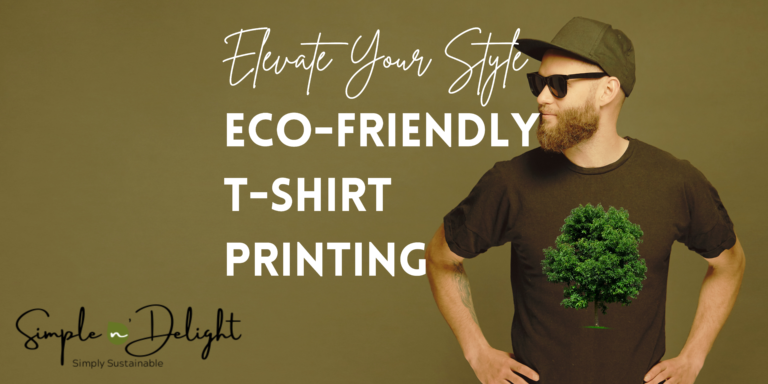






4 Responses
Thanks a lot for your post!
I’m just about to order t-shirts with my logo 😃
This is really interesting! The difference in water consumption is crazy!
Thanks for sharing this blog post! It’s quite intriguing. Sustainable clothes are a topic I wasn’t too familiar with before, so this was an eye-opener.
Very Interesting post. It’s always nice to learn about new things. Thanks for this.